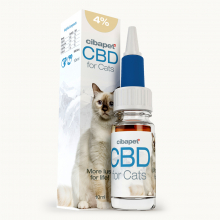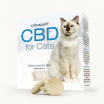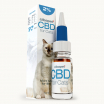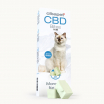Can I Use Human CBD on My Cat?
Published:
CBD, short for cannabidiol, has become an increasingly popular supplement for humans in recent years. Derived from cannabis plants, CBD offers potential health benefits without causing a “high” like THC. This has left many cat owners wondering: can I use human CBD products on my feline friend? There are some important factors to consider before giving your cat any CBD product meant for human consumption.
Contents:
- What Is CBD and How Does It Work?
- Can Cats Take Human CBD Products?
- Benefits of CBD for Cats
- Is CBD Safe for My Cat?
- Dosing CBD for Cats: A Veterinarian's Advice
- Choosing the Best CBD Products for Cats
- Talking to Your Vet About Using CBD for Your Cat
- FAQs About Using Human CBD for Cats:
- Key Takeaways on Giving Human CBD to Cats
- Frequently Asked Questions About Using Human CBD Oil for Cats
- Is it safe to give my cat human CBD oil?
- What are the risks of using human CBD oil for cats?
- What dose of human CBD oil should I give my cat?
- What are signs my cat had too much human CBD oil?
- Can I rub human CBD oil on my cat's paws/fur?
- Why can't I just give my cat the same CBD dose I take?
- Is human CBD subject to regulation for pets?
- Can my veterinarian prescribe human CBD oil for my cat?
- Are there any approved medical uses of CBD for cats?
- Should I ask my vet before using human CBD oil on my cat?
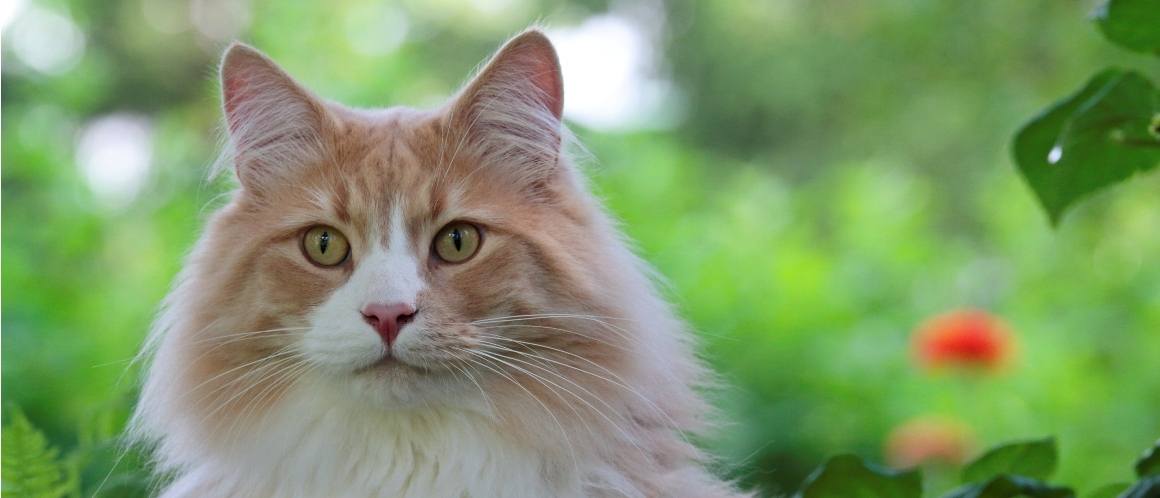
What Is CBD and How Does It Work?
CBD is one of over 100 chemical compounds known as cannabinoids found in cannabis plants. Unlike the well-known cannabinoid THC, CBD is non-psychoactive. This means it does not produce any mind-altering effects.
Research shows CBD interacts with the body’s endocannabinoid system (ECS), a complex cell-signaling system that helps regulate various functions like sleep, appetite, pain and immune system response. The ECS produces its own cannabinoids, called endocannabinoids. CBD can augment levels of endocannabinoids in the body by preventing their breakdown.
Higher endocannabinoid levels may help the ECS better regulate biological functions that are out of balance. This potential to encourage homeostasis is why CBD is studied for numerous health applications.
Can Cats Take Human CBD Products?
When it comes to CBD for pets, there are a few important considerations:
CBD Products Are Not Regulated
The CBD industry remains unregulated by the FDA. Without regulation, CBD products can vary widely in terms of their ingredients, CBD content and quality. Always check for third-party lab testing before purchasing any CBD product. Reputable brands will provide lab reports verifying the CBD and THC content of their products.
Cats and Humans Metabolize CBD Differently
While humans and cats both have endocannabinoid systems (ECS), there are differences in how CBD is absorbed and metabolized. Factors like a cat's smaller size and faster metabolism must be taken into account when dosing CBD. What is safe for a human could be too potent for a feline.
CBD Could Be Toxic for Cats
Cats are extremely sensitive to CBD and THC, especially in higher doses. THC can be toxic to cats, causing symptoms like vomiting, staggering and seizures. While pure CBD is not known to be toxic, giving a cat an excessive dose of CBD meant for human consumption could make them ill. Always consult your veterinarian before giving CBD to cats.
Quality and Dosage Are Key for Cats
With an unregulated CBD market, human products may contain little CBD, inaccurate dosages or ingredients unsafe for cats. Using properly formulated feline CBD under veterinary guidance can help avoid adverse reactions. Cats require much smaller CBD doses than humans. Human CBD products could provide inconsistent, improper dosing for a cat.
So while it is possible for cats to take certain human CBD products, pet owners need to exercise extreme caution. Only use brands providing third-party lab testing and consult a vet on proper dosing. Ultimately, products formulated specifically for feline use will be safest.
Benefits of CBD for Cats
While research is still in early stages, initial studies suggest CBD may provide similar benefits for cats as it does for humans. Potential effects that may help improve feline health and wellness include:
Reduction of Anxiety and Stress
Like humans, cats can experience anxiety disorders and situational stressors that reduce their quality of life. Human research shows CBD engages with brain receptors involved in regulating fear and anxiety responses. Studies investigating CBD for anxious pets indicate it may be helpful for stressed cats as well.
Anti-Inflammatory and Pain Relieving Effects
CBD demonstrates anti-inflammatory and pain-relieving properties in human trials. By targeting inflammation and interacting with pain receptors, CBD may provide cats relief from joint pain and conditions like arthritis. More research is still needed on CBD’s specific effects for feline pain and inflammation.
Anti-Nausea
Cats occasionally suffer from nausea and loss of appetite. Human studies show CBD may have anti-nausea effects. While specific feline research is lacking, anecdotal evidence from cat owners suggests CBD could aid nausea in cats as well. As with humans, the anti-inflammatory properties of CBD could also stimulate a cat's appetite.
Anti-Seizure
Feline epilepsy and seizure disorders can significantly impact a cat's health and quality of life. Human trials demonstrate CBD has anti-seizure effects, reducing seizure frequency by interacting with brain receptors involved in seizure activity. Given similarities between human and feline physiology, CBD may offer seizure-reducing effects for cats. However more studies directly assessing CBD for cat seizures are warranted.
Cancer Symptom Relief
CBD shows potential to reduce symptoms and side effects related to cancer and cancer treatments like chemotherapy and radiation. Effects like reducing pain and nausea may help improve quality of life in cats undergoing cancer treatment. Research also indicates CBD may slow or inhibit cancer growth. However clinical trials directly testing effects of CBD for cat cancer are still needed.
Is CBD Safe for My Cat?
While initial research indicates promise, is CBD ultimately safe for cat use? Unfortunately, there are still many unknowns when it comes to effects of CBD in cats. Potential side effects and safety concerns include:
Lack of Regulation
With no regulation by the FDA, the CBD market remains plagued by inconsistent dosing, inadequate quality control testing, and mislabeling. This increases risks of contaminants or unpredictable CBD concentrations in products. Extreme caution is warranted when giving CBD to pets.
Interactions with Medications
CBD can potentially interact with certain feline medications by inhibiting the activity of liver enzymes responsible for drug metabolism. Always consult your vet before using CBD with any medication or supplement.
Potential Liver Damage
One study in mice showed high doses of CBD triggered liver damage. However, this effect has not been observed in other animal studies or human trials. More research is still needed to confirm if CBD could cause liver injury at certain doses.
Drowsiness/Sedation
CBD often causes mild drowsiness and sedation in humans. These effects may be amplified in cats due to their increased sensitivity. Excessive CBD doses could potentially sedate a cat or impact motor functions like balance and coordination. Proper dosing for a cat's size is imperative.
Digestive Upset
Digestive upset like vomiting or diarrhea has been reported in some cats after taking CBD. This may result from the oil base in CBD products. Cats can be sensitive to certain carrier oils like coconut oil. Starting with low doses can help minimize this risk.
The unknowns surrounding CBD and cats means pet owners should take a "less is more" approach to dosing. Always start with the lowest effective dose under veterinary guidance and monitor your cat closely for any adverse reactions. Also look for high-quality products formulated specifically for pets to reduce safety risks.
Dosing CBD for Cats: A Veterinarian's Advice
While research on CBD for cats is promising, proper dosage and administration is key to providing benefits while avoiding unwanted side effects. Here are some veterinarian recommended tips for giving your cat CBD:
- ALWAYS consult your vet first - Only give CBD to cats under veterinary supervision. Your vet can help determine appropriate dosing and identify potential medication interactions or health risks for your individual cat.
- Start low and go slow - When first using CBD with a cat, begin with an extremely LOW dose. Gradually increase by tiny increments, waiting 2-3 days between each dose increase. Allow time to monitor effects and potential side effects.
- Use pet CBD, NOT human products - Only use CBD products formulated specifically for pets, not human products. Pet CBD contains appropriate doses and carrier oils deemed safe for cats. Avoid any product not providing third-party testing.
- Give the proper dose for your cat's size - A typical dose range may be 0.1mg - 0.5mg CBD for every 1 lb of body weight, twice daily, but dosing should be tailored to your individual cat. Verify dosing with your vet.
- Administer CBD directly into the mouth - For most consistent dosing and fast absorption, administer CBD oil directly into your cat's mouth. Mixing with food may provide inconsistent doses if your cat does not finish their meal.
- Monitor effects/reactions - Keep close tabs on your cat after giving CBD to ensure the dose is well tolerated. Look for any signs of sedation or digestive upset. Adjust dosage accordingly under your vet's guidance.
By following these guidelines, pet owners have the best chance of safely administering CBD to cats in a way that maximizes benefits. Monitoring your individual cat's reaction to CBD remains key. Close communication with your veterinarian can help fine-tune an optimal CBD regimen for your feline friend.
Choosing the Best CBD Products for Cats
To safely administer CBD to cats, choosing a high quality, veterinarian-recommended product is essential. Here are tips for selecting effective, trustworthy CBD for your feline:
Made Specifically for Pets
Only use CBD formulated for pet consumption, not human products. Pet CBD contains doses, carrier oils and flavors cats can properly digest. Human CBD also often contains additional herbs unsuitable for cats.
Organic and Non-GMO
Seeking organically grown CBD from non-GMO hemp minimizes chemical exposure. This is especially important for smaller animals like cats who are more sensitive to toxins. Many pet CBD products today are organic and non-GMO.
Third-Party Tested
Only buy from brands that provide current third-party lab testing showing the exact CBD and THC content. This verifies the CBD purity and potency match what is stated on the label. Testing also checks for contaminants like heavy metals, pesticides and solvents.
CO2 Extraction
CO2 extraction yields a pure, high-quality hemp extract. Alternative methods like using solvents leave behind residues that could be harmful for pets. CO2 extraction ensures no dangerous chemical residue remains in the finished extract.
Cat-Friendly Flavors
Flavored tinctures can help mask the earthy taste of CBD oil. But make sure flavorings like fish or catnip oil are feline-safe. Cats should avoid flavors with essential oils, which can be toxic to cats when ingested.
Reputable Brand Reputation
Do your homework to ensure the brand has a solid reputation for quality and transparency within the CBD industry. Read reviews, check if they belong to industry groups like NASC, and see what others report about their experiences using the company’s pet products.
Veterinarian formulated CBD that meets these criteria are safest for cat owners to consider when exploring CBD as a wellness supplement. Partnering with a trusted CBD brand along with your cat’s vet provides the best approach to integrating CBD into your cat’s care.
Talking to Your Vet About Using CBD for Your Cat
Bringing up cannabis or CBD use for your cat can feel intimidating. Here are some tips for productively discussing CBD with your veterinarian:
Come armed with information - Research CBD benefits and risks in cats beforehand so you can have an informed discussion. Print resources to bring like clinical studies and news articles.
Keep an open mind - Understand your vet may express reservations until more clinical evidence exists. Keep the dialogue open and constructive.
Ask about dosing/interactions - Assuming your vet is open to a trial, ask for their dosage suggestions and discuss any potential medication interactions to monitor.
Share your own observations - If you do try CBD with your vet's consent, report back on the effects and side effects you observed in your individual cat.
Be honest about use - Don't hide CBD use from your vet, even if recommending against it. They need to know about any supplement or medication your cat receives.
Discuss integrative options - If your vet is resistant, discuss using CBD as part of an integrative or holistic treatment plan, combining conventional care with complementary therapies.
With CBD use growing among pet owners, more veterinarians acknowledge it warrants further investigation and consider its potential judiciously on a case-by-case basis. Don't be afraid to bring up natural options like CBD, but always defer to your vet’s assessment of what is right for your cat’s needs. Their guidance is crucial for navigating CBD use safely and effectively.
FAQs About Using Human CBD for Cats:
Is human CBD oil safe for cats?
Human CBD oils are generally not recommended for cats. CBD oils formulated specifically for pets will be safer, providing accurate dosing and flavors cats can properly digest. Always consult your vet before giving any CBD product.
What dose of CBD should I give my cat?
There is no set CBD dose for cats. Factors like weight and reason for use impact ideal dosage. Most experts recommend 0.1mg to 0.5mg of CBD per 1 lb of body weight twice daily as a starting point. Your vet can help determine an appropriate dose for your individual cat.
How much CBD oil should I give my 15 lb cat?
For a 15 lb cat, a typical starting dose would range from 1.5mg to 7.5mg of pet CBD oil, twice daily. It’s safest to begin on the lowest end of this dosage range under veterinary supervision. Gradually increase from there while monitoring your cat’s response.
Can I give my cat CBD oil daily?
Daily CBD administration is likely safe for most cats, though long term studies are still needed. Veterinary guidance is recommended to determine if daily use is appropriate based on your cat’s health needs. Your vet can also advise you on any required dosage adjustments over time.
How long does it take for CBD oil to work on cats?
Most pet owners report the effects of CBD oil in cats start to become noticeable within 15 to 30 minutes of administration. Effects tend to peak around 1-2 hours post-dose. Duration of effects varies but often last 4 to 8 hours.
What are signs of too much CBD for cats?
Potential signs your cat may have had too much CBD include lethargy, lack of coordination, excessive vocalization, vomiting, trembling or seizures. Seek veterinary attention immediately if your cat shows signs of CBD overdose.
Can I put CBD oil in my cat's food?
Mixing CBD into food makes dosing less consistent as cats may not finish all their food. For optimal absorption and reliable dosing, administer CBD oil directly into your cat's mouth. Check with your vet first on the best method for your cat.
Is CBD legal for pets?
Under federal law CBD derived from hemp containing less than 0.3% THC is legal in the US. However several states still restrict CBD possession. Many veterinarians also remain hesitant to recommend CBD due to lack of regulation and research.
Key Takeaways on Giving Human CBD to Cats
While CBD shows promise for cats, pet owners need to exercise extreme caution:
- Buy only veterinarian-approved, pet-specific products - NEVER use untested human CBD oils.
- Always consult your vet before administering, and follow their dosage recommendations.
- Start with an extremely low dose and gradually increase under veterinary guidance while monitoring for side effects.
- Ensure the product has up-to-date third-party testing proving purity, potency and safety.
- Monitor your individual cat closely for any adverse reaction after dosing.
- Work openly with your vet on determining if CBD may be beneficial for your cat’s needs.
With proper cautious use under veterinary supervision, CBD may offer a supplemental option for supporting feline health and wellness. But never give any CBD product to your cat without guidance from your vet on appropriate dosing and what to watch out for. By partnering closely with your vet and choosing quality pet products, cat owners can help make sure any use of CBD for their kitties stays on the safe side.
Frequently Asked Questions About Using Human CBD Oil for Cats
Is it safe to give my cat human CBD oil?
No, human CBD oils may not be safe for cats. CBD oils formulated specifically for pets are safer since they contain appropriate doses and carrier oils for cats. Human CBD oils could contain inappropriate ingredients, flavors or incorrect dosing for feline physiology. Always consult your veterinarian before giving any CBD product to your cat.
What are the risks of using human CBD oil for cats?
Risks include:
- Incorrect or inconsistent dosing for cats, potentially leading to toxicity.
- Carrier oils like coconut oil that may cause stomach upset in cats.
- Added ingredients like essential oils that can be toxic to cats.
- Lack of regulation and quality control testing that could lead to contaminants.
- Variability in CBD content that makes dosing difficult.
To minimize risks only use veterinarian-approved CBD oils formulated for pets, not human products.
What dose of human CBD oil should I give my cat?
There is no established safe dose of human CBD products for cats. Human CBD oils are not designed with the smaller size and physiological needs of cats in mind. While extremely small amounts may be safe for some cats, it is impossible to provide exact dosing guidelines for human CBD. Only use feline CBD oils and follow your vet's dosing recommendations.
What are signs my cat had too much human CBD oil?
Signs of CBD overdose in cats may include:
- Lethargy or lack of coordination
- Excessive vocalization or restlessness
- Vomiting or diarrhea
- Tremors, seizures or stiffening of limbs
- Agitation or pacing
If your cat shows any adverse reaction after giving them human CBD oil, immediately contact your veterinarian or Pet Poison Helpline.
Can I rub human CBD oil on my cat's paws/fur?
Topically applying a small amount of human CBD oil may be safer than ingestion in some cases. However absorption will be highly variable. Oils high in essential oils could also still pose a toxicity risk. Only use veterinarian-recommended, pet-safe CBD products on cats.
Why can't I just give my cat the same CBD dose I take?
Humans and cats metabolize CBD differently. Factors like your cat's smaller size, faster metabolism and higher sensitivity to CBD and THC mean they can experience adverse effects from doses safe for humans. Only give cats CBD doses calculated specifically for their body weight under veterinary supervision.
Is human CBD subject to regulation for pets?
No, the FDA has not established regulations or dosing guidelines for use of human CBD products in pets. This lack of oversight means human CBD quality and content can vary greatly. To reduce risks only use CBD formulated for pets, not products marketed for humans.
Can my veterinarian prescribe human CBD oil for my cat?
Most vets will not prescribe or recommend giving human CBD oils to pets due to lack of regulation, research and risks of inappropriate dosing. They may only advise use of pet-formulated CBD on a case-by-case basis. Check with your vet before giving your cat any CBD.
Are there any approved medical uses of CBD for cats?
As of yet, CBD is not an approved medication for cats for any specific medical purpose or condition. More research is still needed on CBD's safety and efficacy for cats. Some vets may recommend CBD based on limited studies and anecdotal evidence, but formal approvals have not been granted.
Should I ask my vet before using human CBD oil on my cat?
Yes, always consult your vet before giving your cat any CBD product, including human CBD oils. Even for short term use, your vet can help determine if CBD might interact with any medications or pose any risks for your individual cat. Never administer supplements or medications to pets without veterinary guidance.
The bottom line is veterinarian-approved CBD oils formulated specifically for cats will be safest. Never give your cat a human CBD oil product without clearance from your vet on proper dosage and what potential side effects to watch out for. Proper caution and guidance from your vet is crucial when using CBD with pets.









